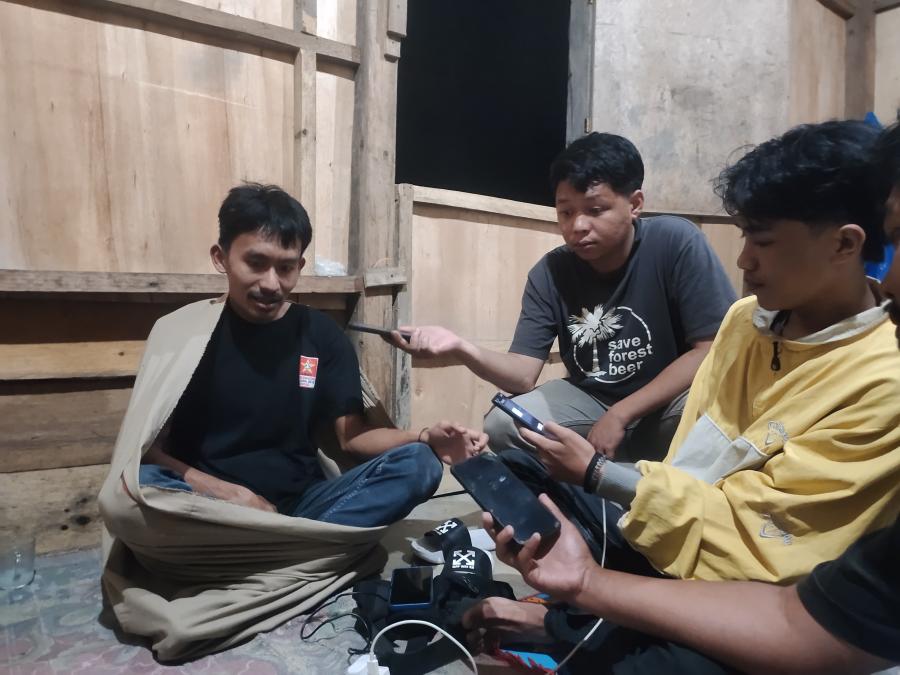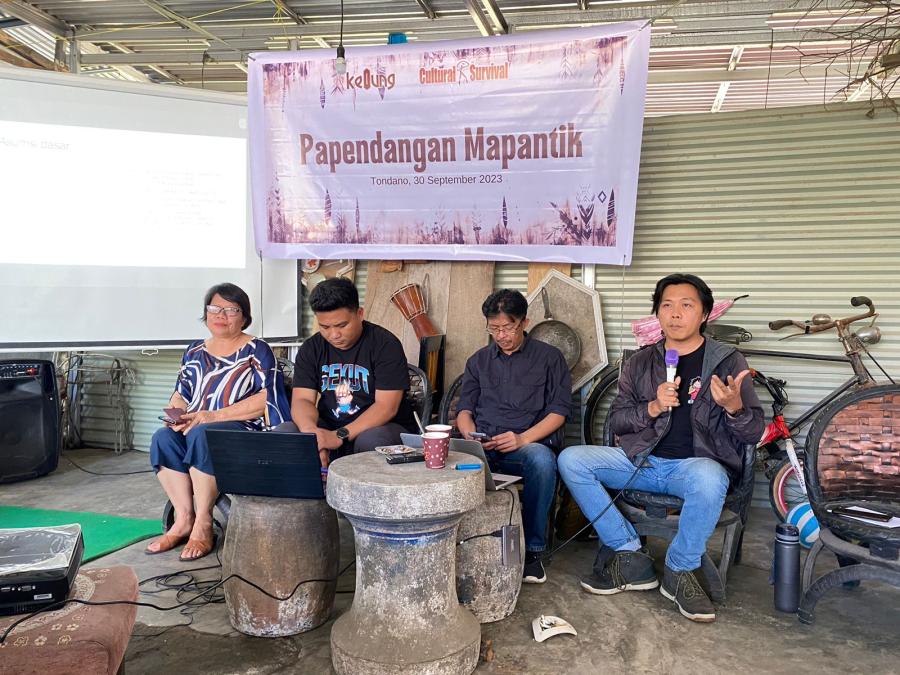Here's an update from the New York Times on the situation in North Sulawesi, Indonesia, where Newmont Mining Company faces charges that its mine caused health problems and environmental contamination. As the Newmont annual shareholders meeting approaches (April 27), we will keep you updated on protests against Newmont from communities around the world. Global Response supports protesters against Newmont mines in Indonesia, Ghana and Peru.
The New York Times
March 27, 2005
Cause of Mystery Ills Splits Indonesian Fishing Village
By JANE PERLEZ
BUYAT BAY BEACH, Indonesia - This is a simple village where the fishermen's
families live on the sea in wooden shacks lighted by oil lamps and most
everyone knows one another. But the people are divided by more than just the
sandy track that passes for Main Street.
Nearly all here agree that there is illness: mysterious lumps, skin rashes,
dizziness and other ailments. But arguments over whether the cause is
pollution from a nearby gold mine and whether the government should relocate
the residents has pitted neighbor against neighbor as that intimate
suffering is played out on a broader stage.
Today, Buyat Bay is the center of an expanding dispute being fought punch by
counterpunch from the courts and government offices of Indonesia to the worn
quarters of environmental groups and the lofty Denver base of the mine's
operator, the Newmont Mining Corporation, the world's largest gold producer.
That fight now includes criminal and civil cases brought by the government
against Newmont, a legal wrangle that has startled Indonesia's foreign
investors and placed Newmont in an unwelcome spotlight.
More than that, the cases have sown deep animosity and division here as
Newmont and the environmental groups mobilize opposing camps in what is
shaping up to be a signal battle for each side.
A government lawsuit seeking 7 million was announced March 9. Most
troubling to Newmont, six of its executives, including two Americans, face
criminal charges of polluting this tropical bay. The executives, who
vigorously deny the accusations, have been prohibited by the court from
leaving Indonesia since last October, when five of them were jailed for a
month. [In a setback to Newmont, the Supreme Court in Jakarta, the capital,
ruled March 17 that the criminal case could go ahead.]
Newmont wholly denies that its operations polluted the area or affected the
health of local people. In particular, it disputes a November government
report, which forms the basis of the civil suit, that said mercury and
arsenic had entered the food chain from some five million tons of mine waste
deposited in the bay over several years.
Such denials have not stalled a parade of accusers as health problems
continue to arise among local people, who say they have little choice but to
eat the fish from their bay and drink the water from their wells despite
warnings in the government report that doing so may be unsafe.
In February, residents from Buyat Bay Village, a town of several thousand
behind this beach community, added their voices to the health complaints,
citing the mysterious death of a child last November and warning in a letter
to President Susilo Bambang Yudhoyono that "what is occurring in Buyat Bay
Village mirrors the circumstances of Buyat Bay Beach, only on a bigger
scale."
Nowhere has the heat of the dispute been felt more sharply than on the
little verandas and in the tiny rooms of this beach community. Sharp words,
angry glares, sullen expressions and constant worry about health pervade
virtually every conversation.
One of the most outspoken is Andi Lensun, the father of Andini, a baby whose
death last July set off the charges that the villagers' illnesses were
related to heavy metal poisoning.
Adding to the bitterness over the death of his baby, Mr. Lensun - whose
porch is decorated with a handmade sign that reads Relocation Yes - said
Newmont had fired him from a modest job cleaning the beach. He said he had
been told, "We'll hire you back if you are no longer associated with the
environmental groups."
The company says that the work was run by a subcontractor and that Newmont
had no control over who was employed.
Some neighbors, who favor the mine, dismissed the health complaints.
Hendrik Pontoh, a leader of the pro-mine faction who said he was working on
a project for Newmont planting mangrove trees, said he did not believe that
the illnesses were related to the mine, or even that all of them were real.
"People are expecting millions by saying they are sick," Mr. Pontoh said.
"The case is blown up because of the nongovernmental organizations. They are
the brains behind the action against the mine." The intensity of the
feelings was overwhelming, he said. "Now people are going to kill each other
over the differences."
This month Mr. Pontoh, other villagers and local officials flew to Jakarta
under the banner of a pro-mine group, Communications Forum, for a meeting
with Health Minister Siti Fadilah Supari.
Soon afterward, the minister canceled a visit to the bay that would have
generated publicity about the poor health conditions. "They told me things
were normal and it was unnecessary to come," the minister said in an
interview.
The local government doctor, Sandra Rotty, a fierce defender of the mining
company that subsidizes her medical center, has become an especially
divisive figure. In interviews many local people complained that she was
unsympathetic to their needs.
"The doctor told me the skin was normal," complained Halifa Modeong, 18, the
mother of a month-old girl, Aryanti, who was born with badly wrinkled skin
on her back and forehead, a condition that appeared similar to that of
Andini, the baby who died last year.
As treatment, Dr. Rotty gave the young mother a bottle of liquid vitamins. A
graduate of the Medical School of Sam Ratulangi University, which is also
subsidized by Newmont, Dr. Rotty said in an interview here that she felt no
need to warn the community about the government report, issued by the
Environment Ministry, which found elevated levels of arsenic and mercury in
the fish from the bay.
"There is no information from the Ministry of Health that the fish have high
arsenic," she said. "As long as I'm not warned by the Ministry of Health, I
don't have to tell people about it."
Newmont says that the fish are no different from those anywhere else in the
world and that the area has naturally occurring arsenic that may be picked
up by groundwater "in trace amounts" over time.
In a letter to senior Indonesian government officials in January, Robert J.
Gallagher, Newmont's vice president for operations in Indonesia, said that
the mine's waste disposal method worked as promised when the government
granted a permit in 1996 and that the presence of heavy metals in the bay
was "not significantly different" now. Newmont has acknowledged putting 37
tons of mercury into the air and the bay. Mining operations finished last
August.
After the government issued the November report, the company moved
aggressively to improve its position and fend off its challengers.
It filed three defamation suits - against a doctor who said last year that
the mine had caused symptoms of heavy metal poisoning, against an
environmental group that had brought a class action suit against Newmont,
and against an outspoken local scientist. The company settled two of the
suits.
The doctor, Jane Pangemanan, was considered exceptionally outspoken because
she had broken ranks with a close-knit medical community in northern
Sulawesi Province that had provided a solid phalanx of support for the
company. Her comments, including those in an interview with The New York
Times, set off a national furor.
In an interview at her home in Manado, Dr. Pangemanan said that soon after
Newmont filed its suit, she was approached by the company to settle. She did
so in February, signing a letter of retraction, which Newmont said she
signed without coercion.
But the doctor said she had felt intimidated trying to stare down the
world's largest gold mining company.
"I felt I had to sign because of the suit against me," she said. "There was
just too much pressure from the outside. My staff told me Newmont has seven
layers of lawyers, and how could I fight them?"
She said she had insisted that as part of the accord the company would take
responsibility for the health of the community. In fact, the accord says
only that the company will "monitor" the public health.
"I am disappointed they haven't done anything about the public health," she
said. "That's why I now think I was wrong in signing."
Newmont also settled, last December, with Agency for Health Law, a legal aid
group that sought 0 million in damages for the villagers. Iskandar
Sitorus, a lawyer with the group, said in a telephone interview that the
villagers had agreed to the settlement, although he acknowledged that they
were not present in court when the suit was settled.
Radja Siregar, a marine expert with Friends of the Earth Indonesia, said the
suit had not been settled with the consent of the villagers or to their
benefit. He and others from environmental groups say they are now preparing
their own class action suit against Newmont.
One person who has not settled is Rignolda Djamaludin, a lecturer in marine
science at Sam Ratulangi University and the director of Kelola, the
environmental group in Northern Sulawesi that has organized the villagers.
He acknowledged that the fight over Buyat Bay was bare-knuckle. "We have a
strategy for our advocacy; they have an advocacy strategy," he said.
The company, he said, does not want the villagers moved, as the November
report recommended. "If you move them, that says to the public something
happened here," he said.
Newmont says it would be willing to accept a "simple apology" from Mr.
Djamaludin. The lead lawyer for the company, Luhut M. P. Pangaribuan, also
said in a telephone interview that Newmont would propose conciliation or
arbitration to settle the civil suit announced by the government in March.
For now, the case looks likely to go ahead. In an interview, Environment
Minister Rachmat Witoelar said he had the "full support" of President
Yudhoyono and the rest of the government to pursue the suit.
Mr. Witoelar visited the bay in February, walking door to door to talk to
families. He told them he believed that they should be moved and promised to
help organize their departure by the middle of the year. "They are
definitely suffering," he said afterward.
But like everything else, leaving Buyat Bay will not be easy, even for those
who have decided that it is in their interest. "I would like to stay here,
because this is where I was born," said Sudiman Modeong, 46, the grandfather
of the baby Aryanti. His family was among the original settlers in the late
1950's.
"But I am thinking of the disease of my grandchild," he said. "I am thinking
of the future. We should move."
Muktita Suhartono contributed reporting from Jakarta for this article.
Copyright 2005 The New York Times Company



